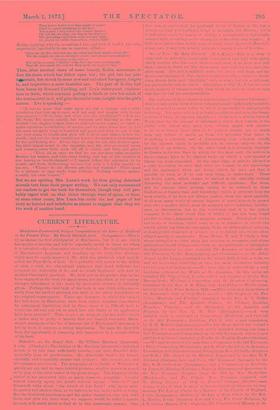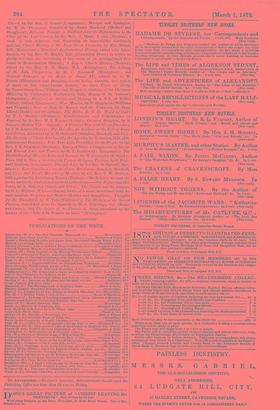Our readers will have observed that the title of "
Current Literature" which stench at the heed of these columns is made sufficiently inclusive, and is attached to meny works to which it can hardly be said properly to belong. The space which it is found possible to assign to the longer reviews of books of superior importance or interest is strictly limited. Works that for the amount of information which they contain, or tho ability with which they have been written might well deserve to be so reviewed, have often to be noticed shortly, not so much from any failure of merit, as from the necessity that there is of making a selection, and of determining that selection chiefly by the interest which is probably felt in various subjects by tho majority of our readers. On the other hand, it is obviously improper to dismiss in the few lines to which, for the most part, the notices in these columns have to be limited, books on which a vast amount of labour has been expended. At the same time, it may be allowed to a critic to confess for once that there are bounds to his knowledge and his endurance, there are books which he does not find it possible to read, or if he can read them, to understand. There are books, again, which cannot be noticed at all critically without discussing the most profound and difficult questions. For these, and for various other reasons, mostly to be referred to those limitations of human time and knowledge which a reviewer feels the most acutely, if he does not always confess them the most candidly, of all men, many works of various degrees of merit have to be passed over with a neglect which must be assigned not to indolence, indiffer- ence, or discourtesy, but to the conviction that it is the justest comment to be silent about that of which it has not been found possible to form a judgment on adequate grounds. Theological works and books of devotion, which come to lie in numbers of which the outside public can form no conception, books on philosophical subjects, or dealing with branches of science or of technical art, we arc often obliged merely to enumerate. From Messrs. T. and T. Clark, a firm whose enterprise we have often had occasion to recognise, and whose publications would of themselves form no inconsiderable or incomplete theological library, we have received The Kingdom of God under the Old Testament, by Dr. Heng-stenb:irg, and Commentaries on St. John's Gospel, by Dr. Lange, translated by Dr. Schaff, D.D.r 2 vols., a work, wo may say in passing, exhibiting at once the most exhaustive industry and the soundest judgment. —We have also to ackuowledge it very handsome edition of the Works of St. Augustine. In this series are included The City of God, 2 vols., edited and translated by the Rev. Marcus Doris; IVrifines in Connection with the Mutt' ist Controversy, translated by the Rev. J. R. King ; and elati-Pefayian Ilrork,s, trans- lated by the Rev. Peter Holmes D.D.—With these may be mentioned S't. Augustine's City of God. Books zi.-xir.; The Origin of the Two Cities, Heavenly and Earthly," translated by the Rev. A. T. Waller (Longmans); and The Apostolic Fathers, St. Clement, Ignatius, Barnabas, Polyealp ; with the Martyrdont tit 5:5. Ignatius and Polyeatp, by the Rev. C. II. Hole (Rivingtone). — A very valuable work is continued in Commentary, Historical and Critical, on the Old Testament ; Leviticus, Part 2, with a new translation, by M. M. Kalisch (Longmans).—The late Dean Alford left behind a fragment of a vast projected work, which included nothing less than a New Translation and Commentary on the Old Testament, which is now published as Genesis and part of Exodus for English Readers (Strahan). —We may mention at the same time a Companion to the Old Testament, a Plain Commentary (Rivingtons), and St. Paul's Epistle to the Romans, a Translation, with Introduction and Notes, by the Rev. J. Challis (Deighton and Bell); The Gospel of St. Matthew Expounded, by the Rev. H. T. Adamson (Sampson Low and Co.); Old Testament Synonyms, by the Rev. R. B. Girdlestone (Longmans); and a Commentary on Leviticus, by James G. Murphy (Triihnor); Xotes on Ilvixences and Quotations in the New Testament Seripture .1i-tint the Old, by Mrs. Maclachlan (Blackwood); and The Vulgate New Testament compared with the Decay Version of 15S2 in Parallel Columns (Bagster).— Among works of what is more or less an historical character we may mention The Life of Orist, by a Member of the Church of England, 2 vols. (Longmans); Outlines of the Life of Jesus Christ, by the Rev. L. Mercier, 2 vols. (Sampson Low and Co.); Ten Great Religions, by J. F. Clarke (Boston, U.S.: Osgood); The Constitutional History of the Church, by the Rev. C. Crosse (Longmans); Martyrs and Apologists, by E. de PressenFe, translated by Annie Harwood (Hodder and Stoughton); Religious Thought in England from the Reformation to the Close of the Last Century, by the Rev. T. Hunt, 2 vols. (Strahan), a work of vast industry, and displaying an impartiality absolutely judicial ; Church History of the First Seven Centuries, by Milo Mahan, D.D. (Rivingtons); Ensebins's Ecclesiastical History. edited with Intro- duction, by the Rev. W. Bright, D.D. (Clarendon Press), in which we gladly welcome the first-fruits of the work of an accomplished Pro- fessor of Ecclesiastical History ; A Key to Church History (Modern), edited by the Rev. T. H. Blunt, M.A. (Rivingtons); The Liturgy of St. John Chrysostom, by H. C. Romanoff (Rivingtons) ; and Scottish Liturgies of the Reign of James IF:, edited by 0. W. Shorts (Edmonston and Douglas).—Of books, sermons, and topics, of more or less controversial divinity, we have Views of Deity, by James Samuelson (Williams and Norgato); Outlines of the Christian Ministry, by Christopher Wordsworth, D.D., Bishop of St. Andrew's (Longmans); Mankind, its Origin and Destiny, by a M.A. of Balliol College, Oxford (Longmans); Ecce Messias, by E. Higginson (Williams and Norgate); Sons of God, the Known and the Unknown, by Dean Alford (Hodder and Stoughton); The Bible ; I.e it the Word of God? by T. L. Strange (Triibncr); Establishments and Voluntaryism in England, by the Rev. M. J. Mayers (Saeley); Oriental Religions, by S. Johnson (Boston, 'U.S.: Osgood); A Festival Year with Great Preachers, by J. M. Ashley (Hayes) ; The Deieides, an Analysis of the Lift ofJesus, by J. Cohen, translated by A. M. Goldsmid (Simpkin, Marshall, and Co.) ; The Doctrine of Christ Developed by the Apostles, by E. Steam), D.D. (Ed- monston and Douglas); It Is Your Life, Preaching for the People, by the Rev. J. B. Johnstone (Strahan) ; Esse and Posse, a Comparison of Divine and Eternal Laws and Powers, by H. T. Braithwaite (Longmans); The Brotherhood of Men, its Laivs and Lessons, by W. Ernsworth (E. Stock) ; From Old to New, a Sketch of the Present Religious Position, by F. Regi- nald Statham (Longmans); Disciple Lift, by the Rev. D. Maccoll (Mac- khose) ; Ecee Consilium ; or, the Great Revelation (Simpkin, Marshall, and Co.); Our Llrd's -Miracles of Healiny, by the Rev. F. W. Belcher, with a preface by Archbishop Trench (Parker).—Mr. Bekher, we may ob- serve, unites the clerical and medical professions—Our Father and His Laws, by A. Moberky (Smith and Elder); The Church and the Seasons, by G. C. Hignett, M.A.—Among books of a more devotional kind we may mention Scripture and Nature (Hodder and Stoughton); Thoughts for the Thonyhtfid, by W. Tait (Whittaker); The History of the Sacred Passion, translated from the Spanish by H. J. Coleridge, S.J. (Burns and Oates); and The Spirit of St. Francis de Sales, translated by the Author of the "Life of St. Francis de Sales" (Rivingtons).



































 Previous page
Previous page